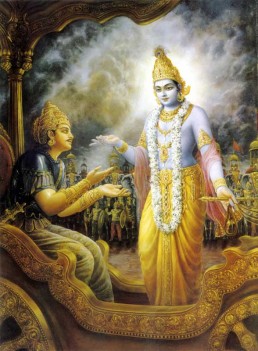Swami Chinmayananda Commentary
The word Dharma in Sanskrit is the most elusive word for translation into English. It is used generally in more than one definite meaning. Terms like righteousness, good conduct, duty, noble quality, etc., are some of them. We have explained it earlier and found how Dharma essentially means “the Law of being” of anything in the world.
That which determines one man’s personality as distinctly different from another’s, it is very well known, is the texture of the thoughts entertained by him. This texture of his thoughts is, again, in its turn, determined by the pattern of thinking (vasanas), which his mind has gained from its own past. These pre-determined ‘channels-of-thinking’ created by one’s own earlier ways of thinking are called the Vasanas. Thus Dharma should be conceived here as the Vasanas in our mind, for no other explanation will be correct since the very discussion now is upon mental control. The word “duty,” used by us in our translation, is, in this special sense, to be understood as Vasanas.”
Swadharma AND Para dharma — Swadharma is not the duty which accrues to an individual because of his “caste,” which is ever a sheer accident of birth. In its right import Swadharma means the type of Vasanas that one discovers in one’s own mind. To act according to one’s own taste, inborn and natural, is the only known method of living in peaceand joy, in success and satisfaction. To act against thegrain of one’s own Vasanas would be acting in terms of Para dharma — and that this is fraught with danger is very well known.
In the context of the Geeta, there is a direct message for Arjuna. Arjuna is born a prince, trained in the art of war and has exhibited in his life his insatiable thirst for heroism and adventure. Naturally, his Swadharma is that of a prince and that can find fulfilment only in dangerous actions and endless exertions. Perhaps, as it was evident in the first chapter, Prince Arjuna had gathered during his early education, that the life of renunciation and meditation — the life of a Brahmin — was nobler than his own life. And therefore, he wanted to run away from the battle-field into the silent caves-of-meditation. In this stanza, Krishna reminds him that to act according to his own Vasanas, even imperfectly, is the right path for his development. It is dangerous to suppress his own personality-expression and copy the activities of someone else, even if he be living a nobler and diviner life.
THOUGH THE SOURCE OF EVIL HAS BEEN POINTED OUT EARLIER (II-62 AND III-34), YET WITH A VIEW TO ELICITING A CONCISE AND CLEAR STATEMENT OF WHAT WAS BUT DESULTORILY AND VAGUELY EXPRESSED ARJUNA ASKS:
Adi Sankara Commentary
Svadharmah, one’s own duty; being practised even though vigunah, defective, deficient; is sreyan, superior to, more commendable than; para-dharmat, another’s duty; though svanusthitat, well-performed, meritoriously performed. Even nidhanam, death; is sreyah, better; while engaged svadharme, in one’s own duty, as compared with remaining alive while engaged in somebody else’s duty. Why? Paradharmah, another’s duty; is bhayavahah, fraught with fear, since it invites dangers such as hell etc. Although the root cause of evil was stated in, ‘In the case of a person who dwells on objects’ (2.62) and ‘…..because they (attraction and repulsion) are his adversaries’ (34), that was presented desultorily and vaguely. Wishing to know it briefly and definitely as, ‘This is thus, to be sure’, Arjuna, with the idea, ‘When this indeed becomes known, I shall make effort for its eradication’, said:
The Bhagavad Gita with the commentary of Sri Sankaracharya – Translated by Alladi Mahadeva Sastry
Holy Geeta – Commentary by Swami Chinmayananda
The Bhagavad Gita by Eknath Easwaran – Best selling translation of the Bhagavad Gita
The Bhagavad Gita – Translation and Commentary by Swami Sivananda
Bhagavad Gita – Translation and Commentary by Bhaktivedanta Swami Prabupadha
Srimad Bhagavad Gita Chapter 3 – Verse 35 – 3.35 shreyan swa-dharmo – All Bhagavad Gita (Geeta) Verses in Sanskrit, English, Transliteration, Word Meaning, Translation, Audio, Shankara Bhashya, Adi Sankaracharya Commentary and Links to Videos by Swami Chinmayananda and others – 3-35

